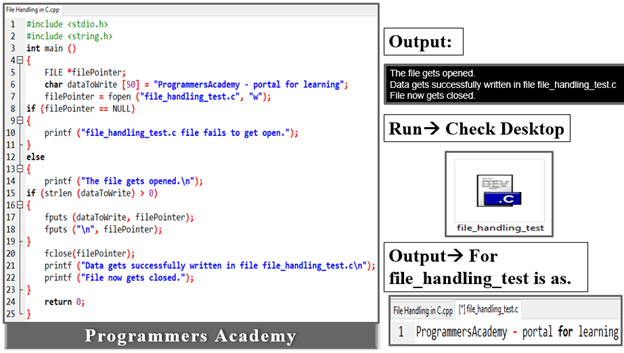File Dealing In C is a course of that means that you can completely write and save a number of bytes of knowledge to disk. This lets you discover and reference the related knowledge at a later time. File processing in C makes use of a file sort construction pointer to declare the file. For instance, an utility has been developed and desires to avoid wasting essential file settings. It should assist file processing to completely retailer configuration knowledge for reference and later operations.
Features Of File Dealing In C Language:
The next are a very powerful file administration features accessible in “C”.

Attributes to File Dealing in C:
To create a brand new file with a number of file processing attributes:

Listed below are a few of the primary features which have syntax to carry out some frequent operations:
1. Studying from a file:
Studying a file includes the usage of fscanf and fgets. Each features are just like the truth that they’ve the identical performance, besides that they use a further parameter, the file pointer, and skim the file simply.
Syntax:
FILE * filePointer;
filePointer = fopen (“file.txt”, “r”);
fscanf (filePointer, “%s %s %s %d”, str1, str2, str3, &date);
2. Writing a file:
Writing to a file might be carried out utilizing the fprintf and fputs features in the identical method as a learn operation.
Syntax:
FILE *filePointer;
filePointer = fopen (“file.txt”, “w”);
fprintf (filePointer, “%s %s %s %d”, “we”, “dwell”, “in”,2020);
3. Closing a file:
If all operations are profitable and you’re at all times prompted to shut the file, you have to use the fclose perform to shut the file.
Syntax:
FILE *filePointer;
filePointer= fopen (“file.txt”, “w”);
# Carry out some file operations after which shut it
fclose(filePointer)
For instance:

Right here Code:
#embrace <stdio.h>
#embrace <string.h>
int primary ()
{
FILE *filePointer;
char dataToWrite [50] = "ProgrammersAcademy - portal for studying";
filePointer = fopen ("file_handling_test.c", "w");
if (filePointer == NULL)
{
printf ("file_handling_test.c file fails to get open.");
}
else
{
printf ("The file will get opened.n");
if (strlen (dataToWrite) > 0)
{
fputs (dataToWrite, filePointer);
fputs ("n", filePointer);
}
fclose(filePointer);
printf ("Information will get efficiently written in file file_handling_test.cn");
printf ("File now will get closed.");
}
return 0;
}
Learn More About: What is Control Statements in C Language
Conclusion:
File processing in programming languages, not simply C, performs an important position, particularly in trade, as a result of it shops knowledge completely in reminiscence and might be referenced at any later time. This can be a particular characteristic of the file processing perform.

